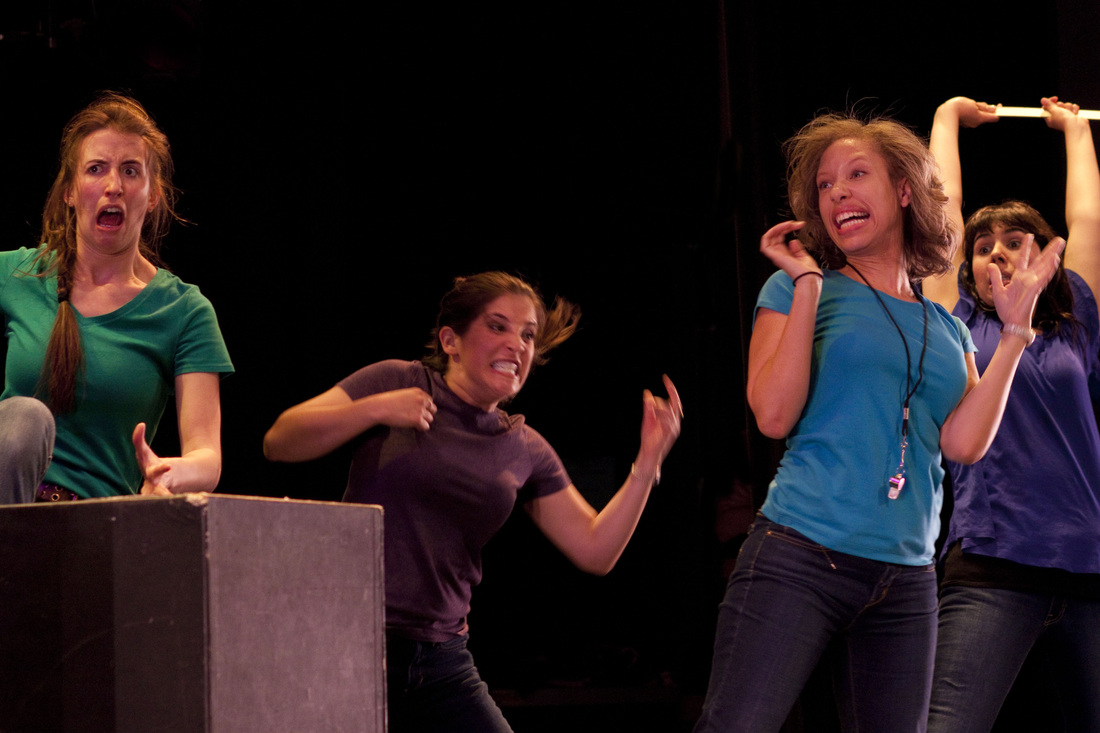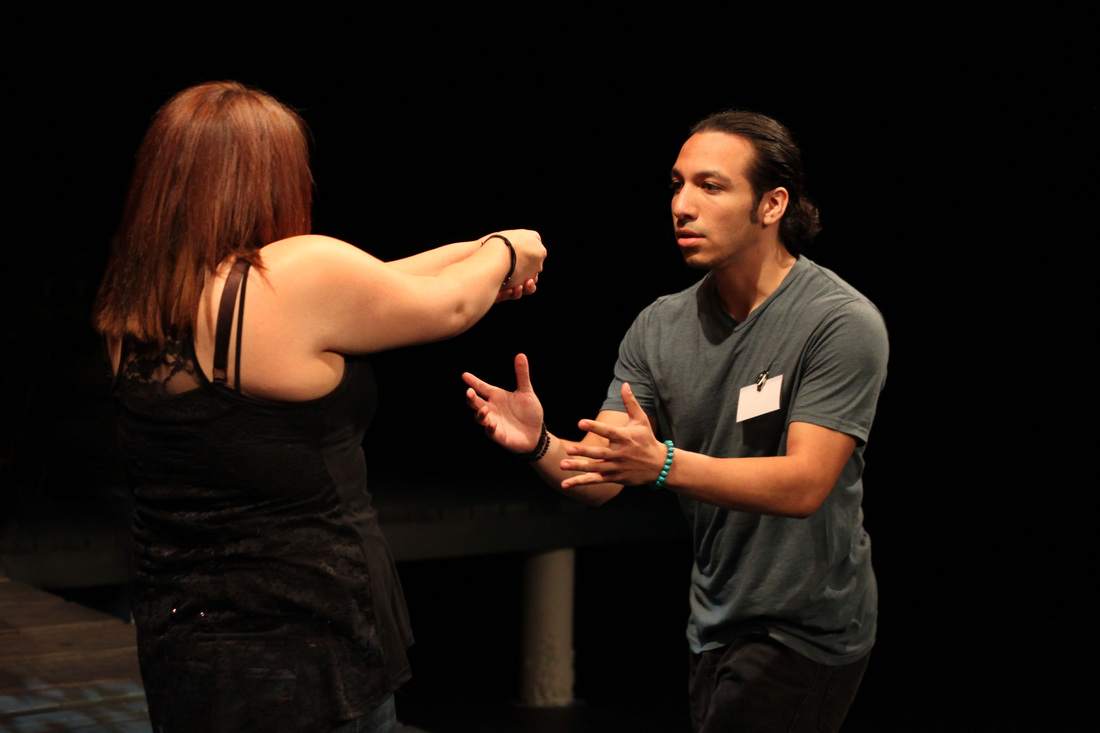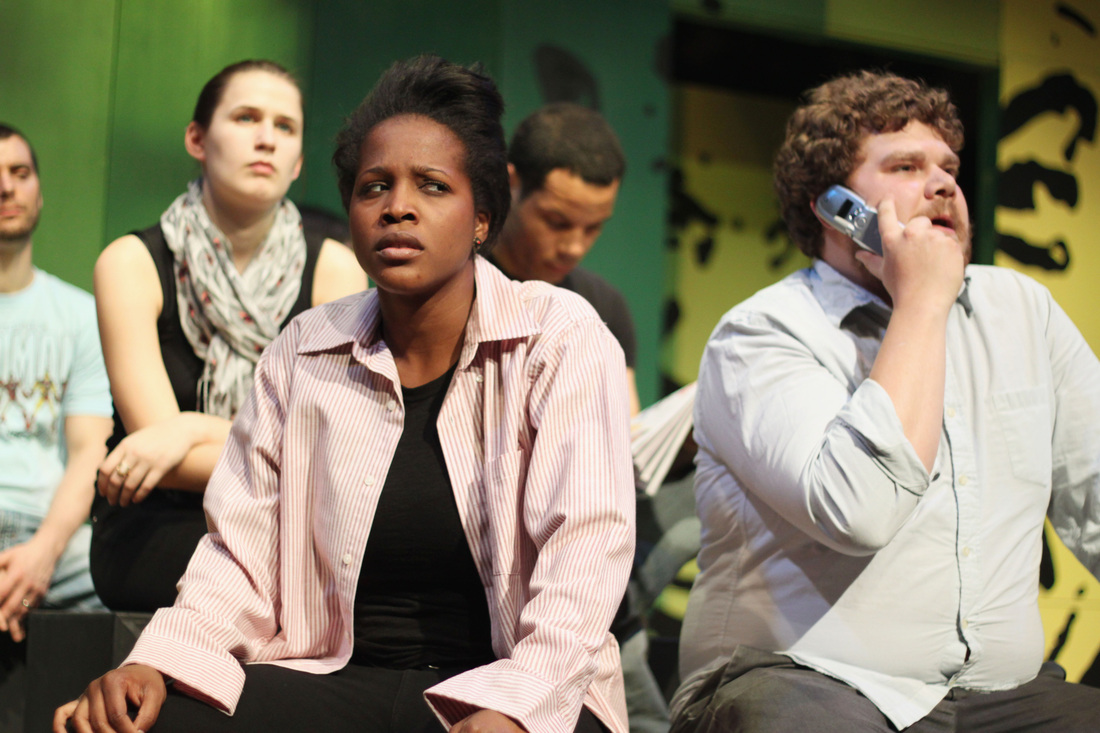|
JACQUELINE LAWTON: Why did you decide to get into theatre? Was there someone or a particular show that inspired you?
NICOLE JOST: I’ve loved theater since I was a kid. But one particular show that inspired me as a young person was Tony Kushner’s Angels in America. I had a suspicion that theater could be a force for social justice, and Kushner’s work confirmed it. I fought very hard to get Part I: Millennium Approaches to my high school stage and, with the support of some wonderful people, I was successful. During one of the performances, right at the moment when Louis and Joe kiss, a teacher who was in the audience gasped audibly. The next day, she came to talk to me. She was embarrassed. She said she had been up all night, thinking about her reaction and the reasons for it. That to me was theater at its best – a moment onstage elicited an honest, visceral reaction that threw into question this woman’s way of looking at the world. From then on, I was hooked. JL: How long have you served as Artistic Director at your company? What drew you to the position? What keeps you there? NJ: I’ve been YPT’s Artistic Director since October 2012. I originally came to YPT as an intern in 2006. I was inspired by my experience in our In-School Playwriting Program. My experience of being a teenager and seeing my words come to life in the hands of professional adult artists became a model for what I hoped to give other young people in DC. I had also seen firsthand the inequalities that pervade DC schools: the education that I and my privileged, mostly white, middle class, friends received did not match what was being offered to the majority of students across the city. Working for YPT became my way to address this injustice using my art form. Being Artistic Director of a small nonprofit with huge ambitions is not easy, but our students keep me going. It’s impossible to be discouraged when a timid student turns in a 20-page play, when a young student pens a fantastical tale of impossible characters, when a student reveals to you that she never thought she was a good writer before she tried her hand at writing a play. I’m very fortunate in the sense that even as Artistic Director I have the opportunity to teach – every Wednesday I lead our Young Playwrights’ Workshop program. The Workshop is YPT’s youth theater company. Members work together to create, develop, rehearse and perform an original play during the course of the school year. It is such a gift to see them every week. I defy you to be in a bad mood after hanging out with these amazing young people. (Come see them at the Source Festival in June!) JL: What is the most valuable lesson you learned during your tenure? Also, what skills and traits do you feel a successful artistic director should have to support the health and growth of an organization? NJ: I’m a very new AD, so I’m still discovering what the position means for me and for the company. So far, the most important thing has been to develop a clear and compelling vision for our artistic programs, and to communicate that vision. For YPT that means not just performances but educational programming – education is the core of our mission. YPT is a highly collaborative workplace, so visioning never happens in isolation. But it’s important to step up as a leader, to pose challenging questions, and to listen. Listening is huge. JL: What excites you most about being an Artistic Director? What is your greatest challenge? NJ: I’m excited about having the big picture in mind. I like to think that way, and I did think that way about YPT even as an intern. (Which was probably very obnoxious.) My greatest challenge is defining what it means to be an Artistic Director for me, for YPT, for an arts education company. And I suppose that other ADs face this challenge as well – how to make the role your own. JL: If your work as an artistic director doesn’t pay the bills, what else do you do? Also, how do you balance your role leading an organization with your work as a director? Are you ever able to direct outside of your company? NJ: I am very fortunate that my work as an Artistic Director does in fact pay the bills. My challenge is balancing my work as a playwright with my work as Artistic Director. I pour a lot of myself into YPT, and sometimes that means at the end of the day I don’t have it in me to write. That’s hard, but it also forces me to think seriously about balance and maintaining a healthy frame of mind. Those are things I think everyone should consider, no matter what your job is, so in that way it’s actually a blessing. But YPT also sustains me as an artist. I’m engaged every day in making theater, so I work out my creative muscles regularly. I do work with other companies on my own plays (in fact, YPT only produces the work of our students, so I am not eligible to have my work produced within the company). These experiences help me relate to our students. As a teaching artist, I can get locked into the role of cheerleader, always saying “You can do this.” Doing my own writing reminds me that making theater is hard! We are challenging our students in a big way, and it’s important for me to remember that as a leader. JL: Looking at your body of work as an artistic director and a director, how conscious are you and selecting plays by women or people of color when deciding your season? Also, when it comes to hiring administrators, designers and other directors do you take race and gender into consideration? NJ: YPT is committed to improving access and equity in the field of arts education. The cuts in the arts that we hear so much about have disproportionately impacted young people of color (particularly African Americans and Latinos) and working class communities. Every young person has a right to learning in the arts, and in fact I have found through working with YPT that the arts have a special power to help students who are struggling – whether it be because of racial and gender oppression, poverty, the challenges of being an English Language Learner or having a learning disability, or something else. I’ve seen it over and over again: for students who are having problems in school, YPT’s program provides a breath of fresh air. It’s a chance for students to think and work differently, which many students need. So it is very important to us to study our impact on the DC region and offer our programs to those students who may not otherwise have access to quality arts education. Our production season is directly informed by the students we serve, so the plays we produce will always reflect the diversity of our students. As far as our artists and staff are concerned, we are like many other arts education organizations across the nation: a mostly white staff serving mostly students of color. This is an important problem for us. It’s something I will be devoting a lot of energy to specifically in the next three years as we embark on a new strategic plan. JL: DC audiences are ... NJ: Of many diverse appetites – I think you could find an audience in this city for any show you could possibly dream up. JL: DC actors and designers are ... NJ: Inventive. Dedicated. JL: DC playwrights are ... NJ: A force to be reckoned with! JL: DC critics are ... NJ: Thoughtful. Open-minded. JL: What advice do you have for an up and coming theatre artists who have just moved to D.C.? NJ: See everything. If you see something you like, hang out in the lobby. Meet the artists. Offer to usher, put up fliers, sweep the floor, whatever. The artists in this community are so welcoming, and the more connections you make the more opportunities you will have. The more you will grow. JL: What's next for you as a director and your company?? NJ: YPT’s biggest annual production, our New Play Festival, will go up on April 22 and 23. All performances are free and open to the public. This year, we considered over 850 plays written by elementary, middle and high school students in YPT’s In-School Program. Only 12 will be produced in April. So the selection process was our most competitive ever, and the 12 featured plays are amazing! We also have Young at Heart, which is part of our New Writers Now! staged reading series, on Monday February 11. Last year we held a very successful anti-Valentine’s Day performance, but our hearts have warmed a bit since then so we’ll be celebrating the holiday with four scripts that tackle the downs and the ups of love. To learn more, go to www.yptdc.org.
0 Comments
Your comment will be posted after it is approved.
Leave a Reply. |
My BlogI'm a playwright, dramaturg, and teaching artist. It is here where you'll find my queries and musings on life, theater and the world. My posts advocate for diversity, inclusion, and equity in the American Theatre and updates on my own work. Please enjoy!
Categories
All
Archives
June 2020
Reading List
|



